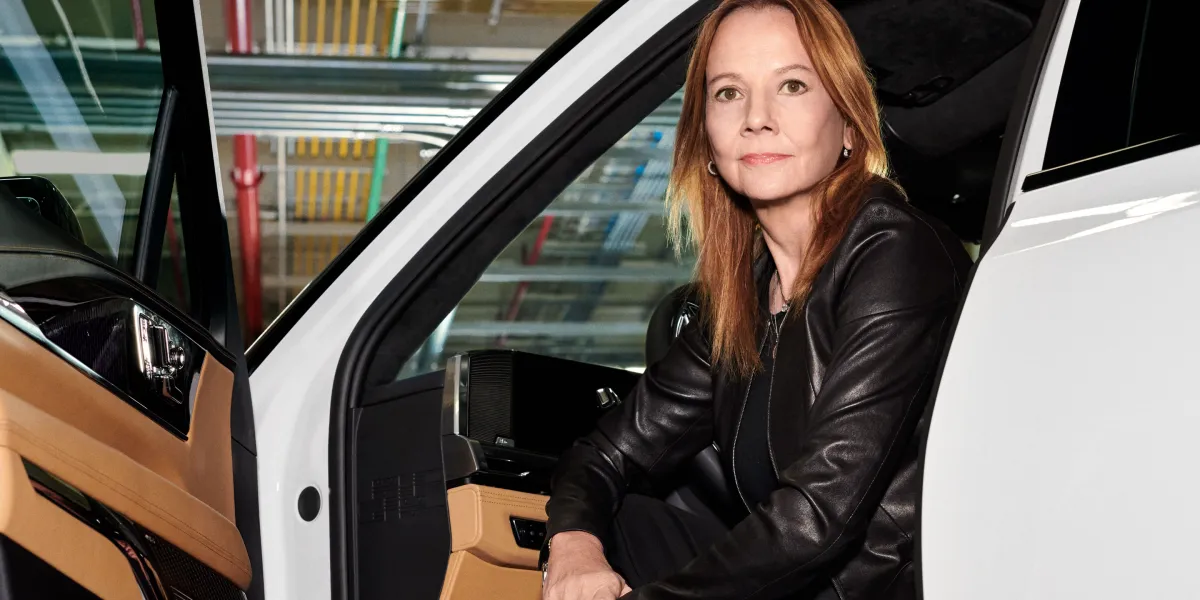Good morning, Broadsheet readers! Melania Trump says she supports abortion rights, Sen. Elizabeth Warren eyes Citigroup, and Fortune’s Michal Lev-Ram examines Mary Barra’s second major transformation at GM. Have a restful weekend.
– EV-olution. The word “transformation” gets thrown around a lot. But few leaders have successfully led companies through one—let alone stayed at the top long enough to try and steer their organization through a second.
Mary Barra, the chief executive officer of General Motors, is in that rare club. Earlier this year, she hit the 10-year mark as CEO, unique for any public company leader but especially a woman. (The average tenure of a Fortune 500 CEO is 7.2 years for men and just 4.5 years for women.) Barra, who ranks No. 1 on this year’s Fortune Most Powerful Women list, came into the job in early 2014, just in time for one of GM’s biggest crises. A few weeks into the role, GM recalled millions of cars due to faulty ignition switches, and Barra found herself testifying in front of Congress—and navigating the automaker through a massive transformation, shifting from a culture that had enabled the crisis to spin out of control to one that encourages employees to speak up, especially on potential safety issues. Fast forward to today, and Barra is now trying to lead GM through another metamorphosis, this time switching from internal combustion engines to electric vehicles.
Mackenzie Stroh for Fortune
No transformation is easy. And the growth in demand for EVs has recently slowed, causing GM to say it would be “flexible” in its transition to electric to reflect customer demand. But Barra remains committed to her ambitious goal of going gas-free by 2035: “We never thought this would be a straight line, a linear transformation,” Barra told me during a recent interview. (Read for the full Q&A with the CEO here.) “There’s 283 million vehicles in the U.S. alone, so it’s going to take a while to change them out.”
As a GM lifer, Barra has witnessed the company go through several previous evolutions, not to mention a near-death bankruptcy, even before becoming its CEO. But perhaps some of her resolve for this current transformation comes not just from her roots in Detroit’s auto culture but also from Silicon Valley, where she’s been spending more and more time, and where GM now has a research and innovation hub.
“One of the things John Chambers [the former CEO of Cisco] said to me was, ‘in Silicon Valley, most people believe they can do the impossible,’” Barra says, recalling a 2016 trip to the Bay Area with her entire leadership team.
It’s still early days for GM’s switch from internal combustion engines to EVs, and the company certainly has its skeptics. But it’s clear that Barra takes the long view–both when it comes to her leadership style, and to the company’s future.
Read the full story here.
Michal Lev-Ram
michal.levram@fortune.com
The Broadsheet is Fortune’s newsletter for and about the world’s most powerful women. Today’s edition was curated by Nina Ajemian. Subscribe here.
ALSO IN THE HEADLINES
– A couple’s contrast. Melania Trump says she supports abortion rights in her upcoming memoir, a stark contrast to her husband’s presidential campaign. The former first lady writes: “Restricting a woman’s right to choose whether to terminate an unwanted pregnancy is the same as denying her control over her own body.” The Guardian
– Growing pains. Sen. Elizabeth Warren (D–Mass.) is calling for growth restrictions on Citigroup as the bank deals with regulatory issues, saying Citi has grown “too big to manage.” Previously, CEO Jane Fraser and other bank executives have stated their commitment to fixing such issues and abiding by laws and regulations. Reuters
– Easing election worries. Director of the U.S. Cybersecurity and Infrastructure Security Agency Jen Easterly reassured voters that the upcoming election cannot be altered by foreign adversaries. Efforts to secure voting, ballot-counting and other election infrastructure has made the system more robust than ever, Easterly says. AP
– Warning sign. Consensual workplace relationships weren’t always a fireable offense for CEOs, but they’re becoming one. Companies are starting to see relationships with subordinates as warning signs for other problematic behavior within an organization. Bloomberg
MOVERS AND SHAKERS
Remezcla Media Group named Thatiana Diaz editor-in-chief of digital publication HipLatina. She will continue to serve as editor-in-chief of Remezcla.
Dealpath, an investment and deal management platform for the real estate industry, appointed Pei Hung as chief financial officer. She was previously head of strategic finance at CloudTrucks.
IONNA, a charging network founded by BMW, General Motors, Honda, Hyundai, Mercedes-Benz, Kia, Stellantis, and Toyota, named Jackie Slope chief technology officer. Previously, she was VP, data analytics and digital at AEG.
Critical Start, a cybersecurity platform provider, appointed Stuti Bhargava as chief customer officer. Most recently, she was chief customer experience officer at OneSpan.
ON MY RADAR
How Epic’s 81-year-old billionaire founder plans to keep her health data empire private forever Forbes
Kesha freed herself. Now she’s saving music Elle
How Bogg Bags, the Crocs of totes, won over America’s moms Bloomberg
PARTING WORDS
“We’re always thinking about things that affect us in America, but this really is a global position. Seeing the issues some women in sport are facing is very sobering.”
— Allyson Felix, retired Olympic track and field athlete, on the perspective she has gained working with female athletes around the world

